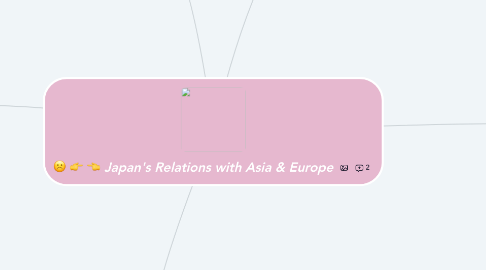
1. Alliance With Britain
1.1. In 1902, Britain signed an alliance with Japan called the Anglo-Japanese Alliance. The basis of this alliance was mutual recognition of British and Japanese interests in Asia.
1.1.1. This treaty was renewed in 1905. -Britain recognised Japan's right to protect Korea, -Japan recognised Britain's right to defend India. Both agreed that China was a place of 'common interest'.
2. Conflicts with China
2.1. First Sino-Japanese War
2.1.1. -Japan defeated China and gained control of the Korean Peninsula -Treaty of Shimonoseki -> China was forced to give up control of Korea and Taiwan to Japan -Japan administered Taiwan as its first overseas colony -> embarked on a colonisation process: construction of schools, railways and other modern infrastructure -The Japanese government tried to rule Korea indirectly -> Korean queen tried to expel the Japanese with the help of Russia-> She was assassinated-> annexed Korea and ruled it directly: education in Japanese, forced labour and military services for Koreans, settlement of Japanese migrants and confisctaion of land for Japanese farmers
2.2. Twenty-One Demands
2.2.1. Japan wanted to expand further into China so it delivered the Twenty-One Demands as an ultimatum to China. China was experiencing political instability.
3. Worsening relations with the USA
3.1. American racism against the Japanese
3.1.1. Racial segregation and discrimination. Laws were passed to protect American economic interests and to exclude the Chinese, Korean and Japanese immigrants to prevent them from competing for jobs. (Chinese Exclusion Act-suspend Chinese immigration, Japanese and Korean Exclusion League). Both the Japanese and American govt faced pressure from their citizens to act against each other.
3.2. Paris Peace Conference
3.2.1. 'Reject the Anglo-American-Centred Peace' written by Prime Minister of Japan. He proposed a racial equality clause to be included in the covanant of the League of Nations. The clause was rejected. Thhis caused unhappiness amongst some Japanese, feeling disrespected.
3.3. Washington Naval Conference (1921)
3.3.1. The USA called for the reduction in the naval forces of the major powers. USA and Britain had the most power, followed by Japan, then Italy and France. This meant that Japan had to reduce their naval strength more than USA and Britain. Japan felt this was unfair and biased against them.
4. Crisis In Japan
4.1. ECONOMIC CRISIS: due to the rapid population increase and shortage of land for farming, Japanese faced internal economic problems.
4.1.1. japan's population had grown rapidly from 45 million in 1900 to 64 milliion by 1930. This affected the availability of land for farming. Farmers did not have enough land to grow their crops and earn a decent profit to support themselves. Japanese farmers also practised traditional farming where planting and weeding were carried out by hand. These methods were extremely labour-intensive and slow.
4.1.1.1. Shortage of rice led to much discontent among the JApanese people. As a result, they lost faith in the government.
4.1.2. Japan was also affected by the Great Depression. The USA and Britain began to practice protectionism in order to shield their own economies. Demand for Japanese exports fell drastically, thus affecting Japan's economy.
4.2. OVERPOPULATION
4.2.1. as the population grew, the demand for housing, goods and products increased. This problem fed Japan's growing expansionist ambitions, taking over more territories meant access to more resources and space for citizens.
4.3. GROWTH OF MILITARY INFLUENCE IN JAPANESE POLITICS
4.3.1. The military attempted to gain more power. The rise of Japanese militarism played a large role in Japan's expansionist ambitions and aggressive attitude towards relations with other countries.
4.3.2. Prime Minister Tsuyoshi Inukai was assassinated. Martial law was declared. The politicians and the emperor granted concessions to the military in hope of preventing further political violence.
5. Conflict with Russia
5.1. The rise of Japan was an immediate threat to Russian interests in the Far East. Russia attempted to establish a permanent military and naval base in Manchuria, which was seen as a security threat to Japan.
5.1.1. Japan initially wanted to reach a diplomatic agreement, however, Russia, thinking that Japan was inferior, was not interested in reaching a compromise. The Russo-Japanese War broke out, with Japan winning. The Treaty of Portsmouth was then signed, giving Japan more land.
5.1.1.1. First time an Asian power defeated a Western power. Greatly boosted the Japaneses morale.

